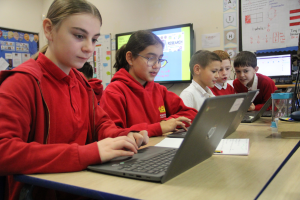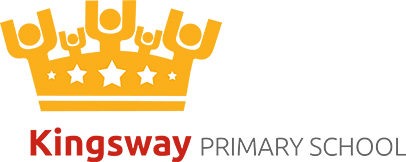Online Safety for Parents
Kingsway Primary School encourages the use of technology to support learning and as a tool for creating media. However, use of online platforms put children at risk, such as:
 seeing disturbing information or images
seeing disturbing information or images- being the victim of online bullying (also known as cyber-bullying)
- being contacted by an adult that they do not know
- sharing personal and identifying information with strangers
- sending or receiving explicit films, images or messages of themselves or others
Parental Controls / Inappropriate Content
It is possible and often quite easy for children to come across things online which are in appropriate for their age. You can use filters to block this content and you can prepare your child by teaching them how to avoid this content.
This could include:
- Pornographic content
- Swearing
- Gambling
- Un-moderated spaces (where there is no supervision).
- Depictions of violence or cruelty
It can be difficult to monitor what your child is doing these days. Children can access the internet on many different devices, and they can often find unsuitable content by accident.
Below we have listed online guides on setting up parental controls for your home and devices.
Internetmatters.org show you where you can set parental controls and what you can protect
Choose what you want to protect and get a guide on how to do it from parentalcontrols-on.org
CBBC/ownit has video’s about getting your first phone and how to stay safe online. https://www.bbc.com/ownit
More information on parental controls from Childnet
In addition, click to download PDF versions of the National Online Safety parent guides outlining important information shared each week to parents.
Social Media: Being ‘Share Aware’
In real life we always encourage children to share, but online it’s different. These days children can use social networks to:
- Share photos
- Message each other
- Meet new people and talk to strangers
- Make video and voice calls
You have probably heard of Facebook, Twitter, YouTube and Instagram, some of the most popular social networks, but whatever is popular changes all the time and it can be hard to keep up.
That is why we recommend using a tool called Net Aware, a tool developed by the NSPCC and O2. This website will help you explore the different social media sites out there by reading what other parents and children think about them. For example here is what people say about Facebook
Links and Resources
NSPCC: Share Aware – Help your child stay safe on social networks
Net Aware – Find out what parents and children think of the most popular social networks
Internetmatters.org – find important and detailed information on how to keep safe online
Parentalcontrols-on.org – protect your children by setting up parental controls
Childnet – Find out more about key issues
ThinkUKnow – Thinkuknow is an education programme from the National Crime Agency’s CEOP Command.

